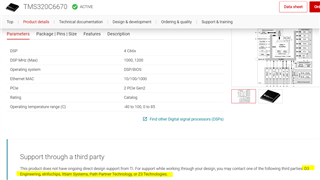Other Parts Discussed in Thread: SYSBIOS
Hello,
I am following the instructions for rebuilding the NDK as listed in section 1.2 od SPRU523K and as listed in the TI wiki
which states the instructions apply to NDK version 2.21 (and higher) only.
I think I have followed the instructions correctly and yet the gmake returns an error that it there is nothing to build.
The exact warning message is:
Warning: nothing to build; the directories named after -P[RrD] don't contain any buildable packages
-P
-Pr ./packages
-PR
-PD
I found it necessary to us the --f option in gmake to force a specific directory even after updating my environment variables(Yes I did reboot).
So I am wondering if this looks more like a OS permissions issue rather than an actual make file issue.
Running gmake without specifying the directory on the command line fails:
C:\WINDOWS\system32>gmake -f ndk.mak clean
gmake: ndk.mak: No such file or directory
gmake: *** No rule to make target `ndk.mak'. Stop.
I find this to be rather odd behavior.
My make file is listed below:
#
# ======== ndk.mak ========
#
#
# Where to install/stage the packages
# Typically this would point to the devkit location
#
DESTDIR ?= <UNDEFINED>
#DESTDIR ?= C:\ti\ndk_2_22_03_20Rebuilt\dest
prefix ?= /
docdir ?= /docs/ndk
packagesdir ?= /packages
# USER STEP: user must define below path to xdc installation
# Set up dependencies
#XDC_INSTALL_DIR ?= C:\ti\xdctools_3_25_03_72
XDC_INSTALL_DIR ?= C:\ti\ccs1020\xdctools_3_62_00_08_core
SYSBIOS_INSTALL_DIR ?= C:\ti\bios_6_35_04_50
#
# Set location of various cgtools
# These variables can be set here or on the command line. The ?= makes
# the command line to take precedence over the setting in this file.
#
# USER STEP: user must define below paths to compilers
ti.targets.C64P ?=
ti.targets.C64P_big_endian ?=
ti.targets.C674 ?=
ti.targets.elf.C66 ?=C:\ti\ccs1020\ccs\tools\compiler\ti-cgt-c6000_8.3.8
ti.targets.elf.C66_big_endian ?=
ti.targets.elf.C674 ?=
ti.targets.arm.elf.Arm9 ?=
ti.targets.arm.elf.A8F ?=
ti.targets.arm.elf.A8Fnv ?=
ti.targets.arm.elf.M3 ?=
ti.targets.arm.elf.M4 ?=
ti.targets.arm.elf.M4F ?=
gnu.targets.arm.M3 ?=
gnu.targets.arm.A15F ?=
#
# Set XDCARGS to some of the variables above. XDCARGS are passed
# to the XDC build engine... which will load ndk.bld... which will
# extract these variables and use them to determine what to build and which
# toolchains to use.
#
# Note that not all of these variables need to be set to something valid.
# Unfortunately, since these vars are unconditionally assigned, your build line
# will be longer and more noisy than necessary (e.g., it will include CC_V5T
# assignment even if you're just building for C64P).
#
# Some background is here:
# rtsc.eclipse.org/.../Command_-_xdc
#
XDCARGS= \
ti.targets.C64P=\"$(ti.targets.C64P)\" \
ti.targets.C64P_big_endian=\"$(ti.targets.C64P_big_endian)\" \
ti.targets.C674=\"$(ti.targets.C674)\" \
ti.targets.arm.elf.Arm9=\"$(ti.targets.arm.elf.Arm9)\" \
ti.targets.arm.elf.A8F=\"$(ti.targets.arm.elf.A8Fnv)\" \
ti.targets.arm.elf.A8Fnv=\"$(ti.targets.arm.elf.A8Fnv)\" \
ti.targets.arm.elf.M3=\"$(ti.targets.arm.elf.M3)\" \
ti.targets.arm.elf.M4=\"$(ti.targets.arm.elf.M4)\" \
ti.targets.arm.elf.M4F=\"$(ti.targets.arm.elf.M4F)\" \
ti.targets.elf.C66=\"$(ti.targets.elf.C66)\" \
ti.targets.elf.C66_big_endian=\"$(ti.targets.elf.C66_big_endian)\" \
ti.targets.elf.C674=\"$(ti.targets.elf.C674)\" \
gnu.targets.arm.M3=\"$(gnu.targets.arm.M3)\" \
gnu.targets.arm.A15F=\"$(gnu.targets.arm.A15F)\"
#
# Set XDCPATH to contain necessary repositories.
#
XDCPATH = $(SYSBIOS_INSTALL_DIR)/packages
export XDCPATH
#
# Set XDCOPTIONS. Use -v for a verbose build.
#
#XDCOPTIONS=v
export XDCOPTIONS
#
# Set XDC executable command
# Note that XDCBUILDCFG points to the ndk.bld file which uses
# the arguments specified by XDCARGS
#
XDC = $(XDC_INSTALL_DIR)/xdc XDCARGS="$(XDCARGS)" XDCBUILDCFG=./ndk.bld
######################################################
## Shouldnt have to modify anything below this line ##
######################################################
all:
@ echo building ndk packages ...
@ $(XDC) -Pr ./packages
clean:
@ echo cleaning ndk packages ...
@ $(XDC) clean -Pr ./packages
install-packages:
@ echo installing ndk packages to $(DESTDIR) ...
@ mkdir -p $(DESTDIR)/$(prefix)/$(docdir)
@ cp -rf $(wildcard ndk_*_ReleaseNotes.html) docs/* $(DESTDIR)/$(prefix)/$(docdir)
@ mkdir -p $(DESTDIR)/$(prefix)/$(packagesdir)
@ cp -rf packages/* $(DESTDIR)/$(prefix)/$(packagesdir)
Please Advise.
Thank You,
Forrest




